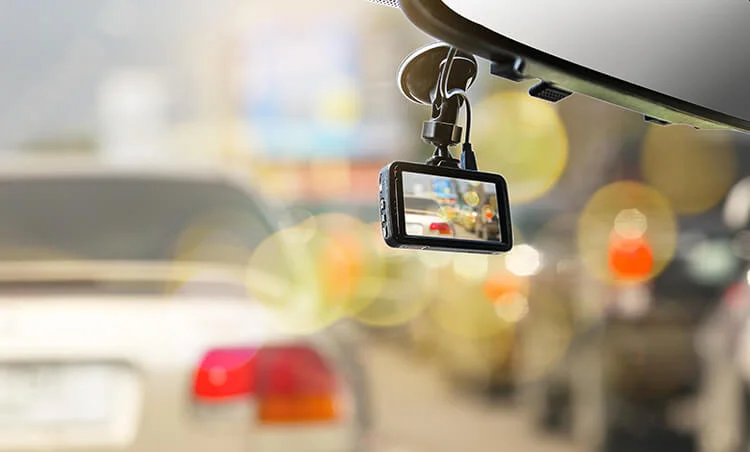Dash cams, also known as dashboard cameras, are increasingly popular among drivers. These small cameras can offer valuable protection for drivers by recording footage of traffic incidents, accidents, and potential road hazards. However, before installing a dash cam in Massachusetts, it’s important to understand the state’s specific regulations for their use.
The Legality of Dash Cams in Massachusetts
Dash cams are generally legal to use in Massachusetts. However, there are specific regulations in place that dictate where you can mount the camera and how audio recording is handled.
Windshield Placement Restrictions
Massachusetts law prohibits placing any non-transparent objects on the windshield that may obstruct the driver’s view. To comply with this regulation, dash cams should be mounted:
- Behind the rearview mirror: This is often the most discreet and unobtrusive placement.
- On the dashboard: Ensure the camera doesn’t block your line of sight.
Avoid mounting dash cams directly on the windshield, as this could be considered an obstruction.
Audio Recording and Consent Laws
Massachusetts is a “two-party consent” state when it comes to audio recording. This means that it’s illegal to record a conversation without the knowledge and consent of all parties involved.
While primarily intended for other types of recording, this law means you should be aware of how your dash cam handles audio:
- Disable audio recording: Many dash cams offer the option to disable audio recording entirely, ensuring compliance with Massachusetts law.
- Be mindful of conversations: If you’re involved in an incident, be aware that the camera might be recording audio of your interactions with other drivers, bystanders, or law enforcement.
Using Dash Cam Footage as Evidence
Dash cam footage can be incredibly valuable as evidence in insurance disputes, car accident cases, or even criminal investigations:
- Admissibility in court: Dash cam footage is generally admissible in Massachusetts courts, provided it complies with the state’s regulations regarding placement and audio recording.
- Proving fault: Footage can help establish fault in an accident by showing traffic violations, reckless driving, or other actions that contributed to the incident.
- Insurance claims: Dash cam footage can support your insurance claim and potentially expedite the claims process.
Additional Considerations and Best Practices
- Privacy of others: While dash cams can be useful for your protection, it’s important to respect the privacy of others. Avoid intentionally filming private property or focusing on individuals unnecessarily.
- Data storage: Consider how you’ll store and manage your dash cam footage. Some cameras offer cloud storage, while others rely on SD cards. Ensure important footage is secured in case you need it.
- Quality: Invest in a dash cam with good image quality for the clearest footage. Look for features like night vision and a wide viewing angle.
- Installation: If you’re unsure of proper installation, consult a professional for assistance to ensure compliance with regulations.
Sources
- [Massachusetts General Laws, Chapter 90, Section 9D] (https://malegislature.gov/Laws/GeneralLaws/PartI/TitleXIV/Chapter90/Section9D)
- [The 2024 Guide To Dash Cam Laws in Every US State – Expert Market] (https://www.expertmarket.com/dash-cams/dash-cam-laws-by-state)
- [Using Dashcam Footage in Massachusetts Personal Injury Case – DiBella Law Offices] (https://www.dibellalawoffice.com/blog/using-dashcam-footage-in-massachusetts-personal-injury-cases/)
Real-Life Examples
- Search for relevant cases: Look for examples online, in law journals, or news archives where dash cam footage aided a legal case or insurance dispute in Massachusetts. Here’s how to find them:
- News searches: Use search terms like “dash cam footage Massachusetts court case” or “dash cam insurance claim Massachusetts”.
- Legal databases: If you have access to legal databases like Westlaw or LexisNexis, refine your search for case law specifically mentioning dash cam evidence.
- Summarize the case: Once you’ve found examples, briefly describe the circumstances of the case and how dash cam footage influenced the outcome.
Interviews
- Identify potential interviewees:
- Lawyers: Contact attorneys specializing in personal injury, car accident cases, or insurance law, as they likely have experience with dash cam evidence.
- Insurance representatives: Reach out to insurance companies in Massachusetts and inquire about a spokesperson who can offer insight on how dash cams influence claims processes.
- Law enforcement (Optional): While less directly connected to insurance/court use, a police officer might provide a perspective on dash cams as an investigative tool.
- Prepare questions: Some sample questions might include:
- How frequently do you encounter cases where dash cam footage is presented as evidence?
- What are the legal challenges or benefits to using dash cam footage?
- Do you have any specific cases you can highlight where dash cam footage was pivotal?
- Are there any trends in dash cam usage you’ve noticed in Massachusetts from your professional perspective?
Addressing Challenges
- Tampering and authenticity: How do courts verify that dash cam footage hasn’t been altered or manipulated? Are there technical standards or procedures?
- Chain of custody How is the dash cam footage collected, stored, and presented in a way that maintains its integrity as evidence?
- Potential loopholes: Could someone challenge dash cam footage as evidence based on placement restrictions or audio recording concerns? Explore any potential legal gray areas.
Tech Trends
- AI-powered dash cams: Some dash cams now have artificial intelligence (AI) for incident detection, driver alerts, and even facial recognition. Discuss how this might impact privacy concerns and legal interpretations.
- Cloud storage and data security: With cloud-connected dash cams, questions arise about data ownership, access, and security risks.
- Dash cams vs. law enforcement: Could dash cams integrated with traffic monitoring systems raise concerns about surveillance and data sharing with law enforcement?
Additional Considerations
- Benefits beyond accidents: Dash cams can record scenic drives, potential road hazards, or even unexpected events (meteor sightings, animal encounters, etc.). Briefly mention these additional uses.



